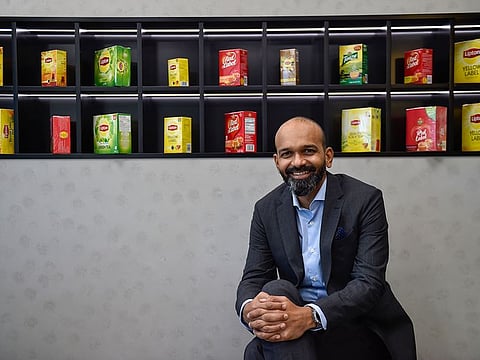Lipton tea's new owner wants to win back dominance of Middle East markets - its Dubai hub will help
Unilever's former tea business ekaterra wants to win back consumers and street-side cafes

Dubai: The new owner of one of the world’s largest tea plants – the Lipton facility in Dubai’s Jebel Ali Free Zone – is quite clear as to what the next step would be.
“We want the Dubai factory to be the largest such in the world – and that’s not too far away,” said Abhiroop Chuckarbutty, President of Africa, Middle East and Turkey operations at ekaterra, which is the former tea business of Unilever, the Anglo-Dutch consumer goods monolith.
“Currently, by volume, the Dubai plant is the world’s second largest; by value, it’s already the largest,” said Chuckarbutty. “How soon we get to the top depends on the plans falling into place. We need to ship more to a couple of countries from here. Because of their import duties, we haven’t been able to do so. That, hopefully, will change.”
It was in November last that Unilever sold its tea business (excluding those in India and Indonesia) to CVC Capital Partners for 4.5 billion euros. Last month, all of Unilever’s widespread regional interests, including the Dubai operations, were consolidated under the new ownership.
Through the decades, the Lipton brand had been a constant in the UAE and other Middle East markets, all of which are heavy on the tea uptake. The Dubai base became operation in December 1998, and Unilever’s plan at the time was for the facility to feed all the demand in the region and some key territories outside as well.
Need to reconnect
At its peak, the Lipton brand had a 75-80 per cent share of the Arabia market. “Over the last decade, it hasn’t done as well,” said Chuckarbutty. “That’s because tea was not seen as a prioritized category and that meant it didn’t get the attention needed. That’s the part we will be changing.”
Coffee wasn’t the cause
Through these 10 years, the coffee culture has taken deep roots in these markets, where the likes of Starbucks, Costa, Caribou and Tim Hortons also filtered in experiences to the whole process of ordering – and savouring – a cup of coffee. Did this have to do with Lipton’s relative retreat?
Chuckarbutty doesn’t see it that way. “Sure, coffee has done a better job at visibility,” he said. “But Lipton’s issue had to do with competition within the tea category itself, from the value brands. So, our first commitment is to win back the consumers.”
Regain the channels
For that to happen, ekaterra and Lipton also need to look at the channels, the small tea cafes that dot the UAE (and Middle East) F&B street-scape, and where the brand was dominant for years. That would be as important as catching the shoppers’ eyes when he or she is there at a store to pick up the household needs.
“We helped create those hot tea store channels in the first place, but ended up walking away from these and which was seized on by the competition,” said Chuckarbutty. “These are thousands of touchpoints where a consumer can experience tea. We need to get back the brand’s on-the-ground presence. That means us taking on the role of a manufacturer as well as a marketing-driven organization.”
A decisive win for ekaterra is how quickly it can map this strategy out as a standalone business.
ekaterra wants to brew higher growth - and flavours will lead that
It was November last that Unilever sold the tea business ekaterra – and the Lipton brand along with it to CVC Capital Partners for 4.5 billion euros. It was a consolidation move on the Anglo-Dutch consumer goods multinational that led to the exit from its tea interests. Apart from Lipton, the other tea brands include, PG tips, Pukka, T2 and TAZO. ekaterra thus has 11 factories in four continents and tea estates in three countries, including the Dubai assets. (However, the India and Indonesia tea interests of Unilever will remain with the parent entity.) Under the new ownership, ekaterra wants to steam up more growth possibilities from the brand’s fruit, herbal and green flavours to add to its strengths in black tea. The flavoured side of the tea business has been hitting some hot growth numbers, over and above those for the natural black tea. “In Arabia, Lipton features in 7 in 10 households,” said Abhiroop Chuckarbutty, President of Ekaterra for the AMET territory. “Our No.1 priority is to strengthen this magnificent brand and offer unparalleled quality and experience to consumers across black tea and fruit, herbal and green.” The fruit herbal and green segment is growing very fast, and we want to not just participate in that but also lead the change. Pukka, a brand recently launched in the region but founded in 2001, embodies this shift. We believe that organic plants are a natural and effective path to nurturing health and wellbeing.”
Sign up for the Daily Briefing
Get the latest news and updates straight to your inbox



